A poignant scrapbook containing a first-hand account of some of the atrocities of the First World War has been discovered in an attic after it lay untouched for 90 years.
The seemingly innocuous item, written by nurse Violet Gossett who served in France during the conflict, was about to be discarded until experts in Derbyshire deemed it an important piece of British history.
Miss Gossett wrote graphic accounts of the horrors of the war, from brains 'oozing' out of head wounds to amputations without proper equipment.
The scrapbook was found at a home in the Midlands by an anonymous vendor and was taken to Hanson's Auctioneers of Derbyshire.
Auctioneer Charles Hanson, said: 'The book contains extracts of the day to day life of a young nurse named Violet Gossett who looked after our heroes serving on the Western Front from 1916-1919.'
'Imagine a ward full of men with their brains oozing out': First World War nurse's scrapbook describing the horrors of the Western Front is discovered in an attic
Scrapbook of First World War pictures by nurse Violet Gossett found after being left untouched for 90 years
It was found in the attic of a Midlands home and almost thrown away before experts in Derby noticed its worth
Extracts show horrific scenes in military wards along with postcards, letters and a Christmas Day menu
The scrapbook is expected to be sold for between £400-£600 at auction later this month
By Joseph Curtis For Mailonline
11 November 2015
Daily Mail
A poignant scrapbook containing a first-hand account of some of the atrocities of the First World War has been discovered in an attic after it lay untouched for 90 years.
The seemingly innocuous item, written by nurse Violet Gossett who served in France during the conflict, was about to be discarded until experts in Derbyshire deemed it an important piece of British history.
Miss Gossett wrote graphic accounts of the horrors of the war, from brains 'oozing' out of head wounds to amputations without proper equipment.
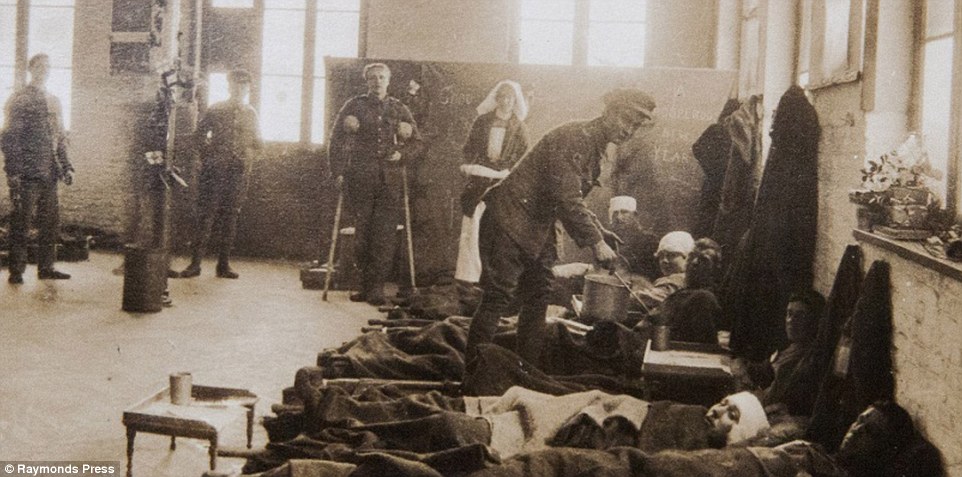
A photo from the lost scrapbook showing wounded soldiers being treated in a military ward in France during the First World War.
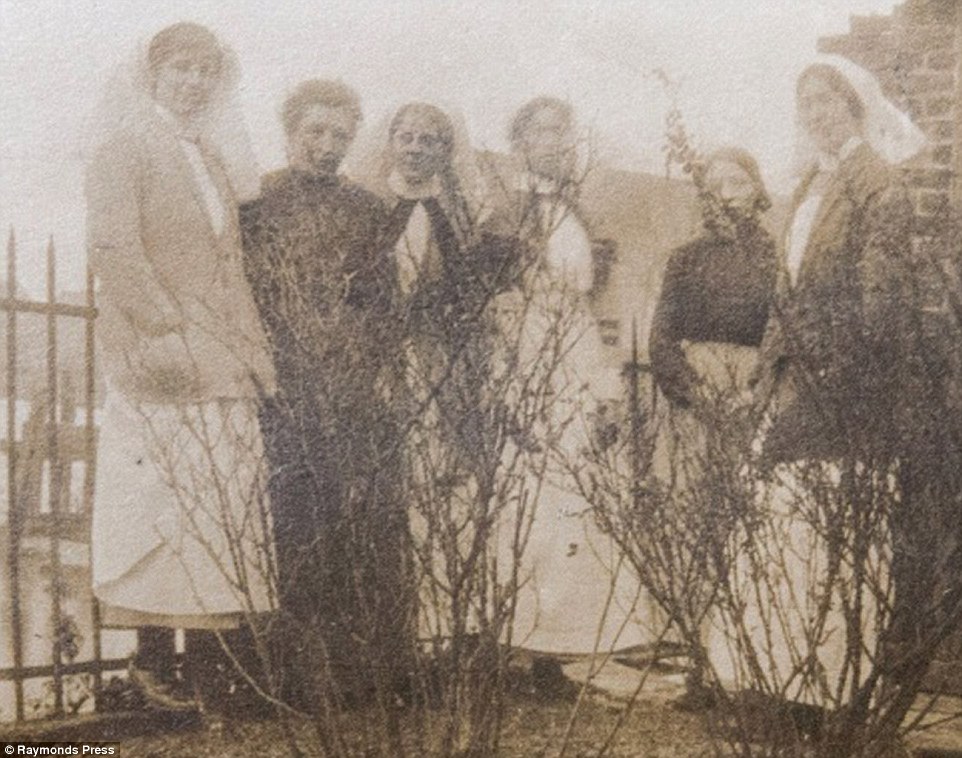 Nurses would see 'blood-curdling' scenes in hospitals on the Western Front including horrific head wounds
Nurses would see 'blood-curdling' scenes in hospitals on the Western Front including horrific head wounds
The scrapbook was found at a home in the Midlands by an anonymous vendor and was taken to Hanson's Auctioneers of Derbyshire.
Auctioneer Charles Hanson, said: 'The book contains extracts of the day to day life of a young nurse named Violet Gossett who looked after our heroes serving on the Western Front from 1916-1919.
'Written in ink on paper, even the pages show the stains of warfare and are a touching and sometimes blood curdling eye witness account of the horrors of WWI.'
Mr Hanson, who appears on the BBC's Bargain Hunt, added: 'One must remember that it was forbidden for any personnel to keep accounts and diaries.
'Had these pages been discovered at the time, Miss Gossett would have been in deep trouble.'
In one extract, Nurse Gossett wrote about her traumatic efforts to treat soldiers' head wounds.
She wrote: 'We had a fearful lot of head cases about this time as the tin helmets were not in use. Imagine a ward full of men with their brains oozing out of bad head wounds'.
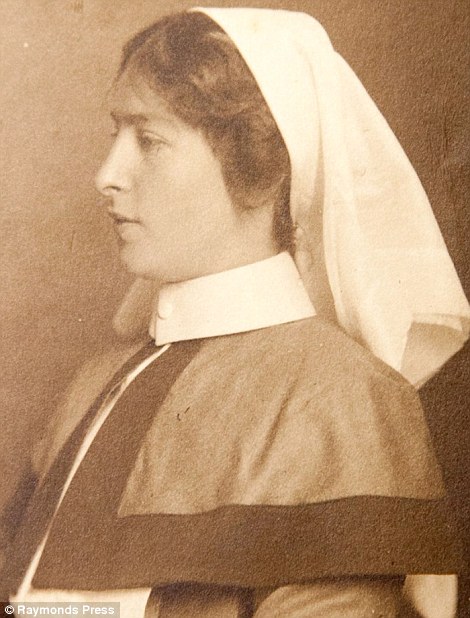
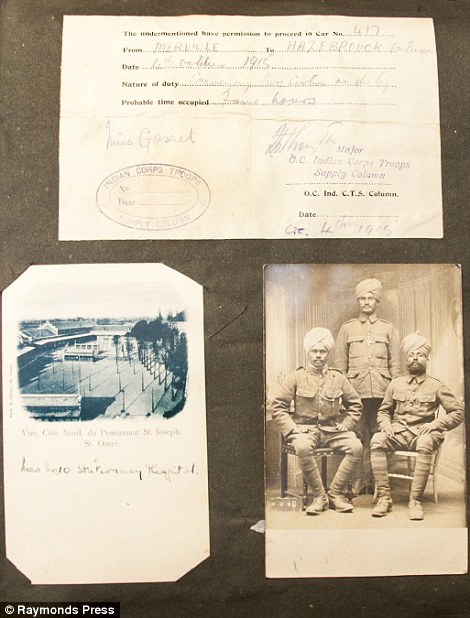
Miss Gossett, top, served on the Western Front from 1916 to 1919. Bottom, some of her scrapbook entries including photos of soldiers from the Indian Corps and official Army documents
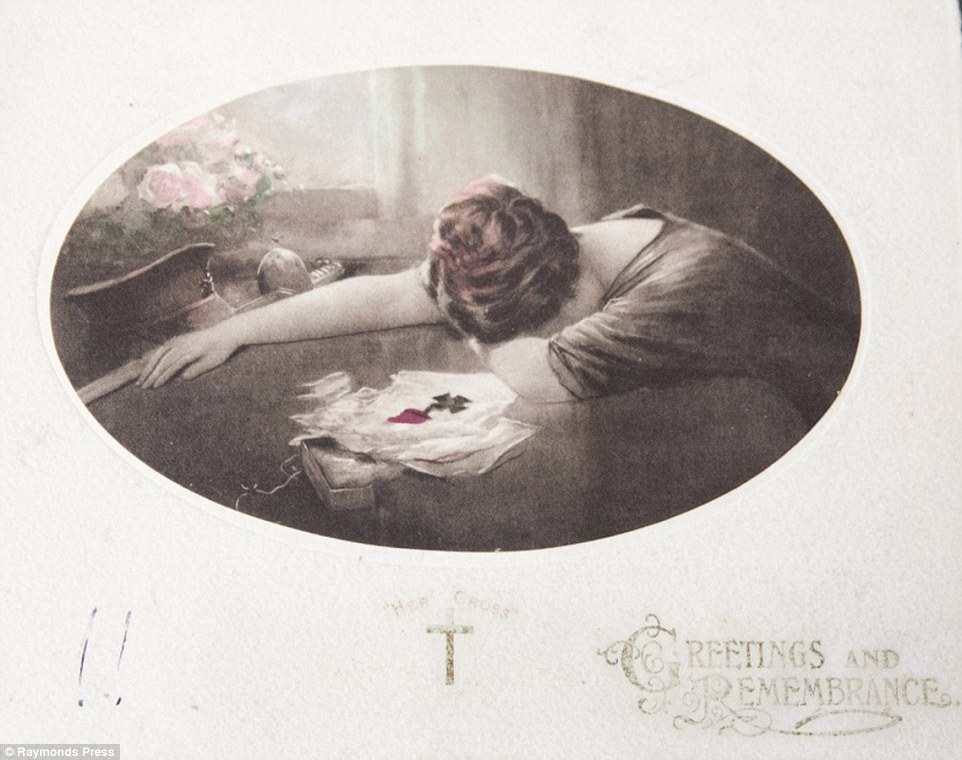
What appears to be a postcard found in Miss Gossett's scrapbook, which was lost in an attic for around 90 years
Another extract said: 'Stretchers packed like sardines everywhere...they come in lying on stretchers in pools of blood all soaked through to the skin..also plastered head to foot in mud.
'Two colonels died here last night and they cannot get the men buried.
'The mortuary was full up, the dead Tommies had been piled up there each in a blanket with their bare feet sticking out'.
Later she mentioned a visit from Lord Derby who had asked if they had everything they wanted.
She replied: 'No...we have an average of one fork for six men. The CO was very angry afterwards.'
There are touching sentimental moments such as Christmas day 1916 which she described as 'very jolly with very few bad cases which we were thankful.
'We decorated where we could. Soup was the first course of six...and we had a different wine with every course..It was great fun and we danced afterwards'.
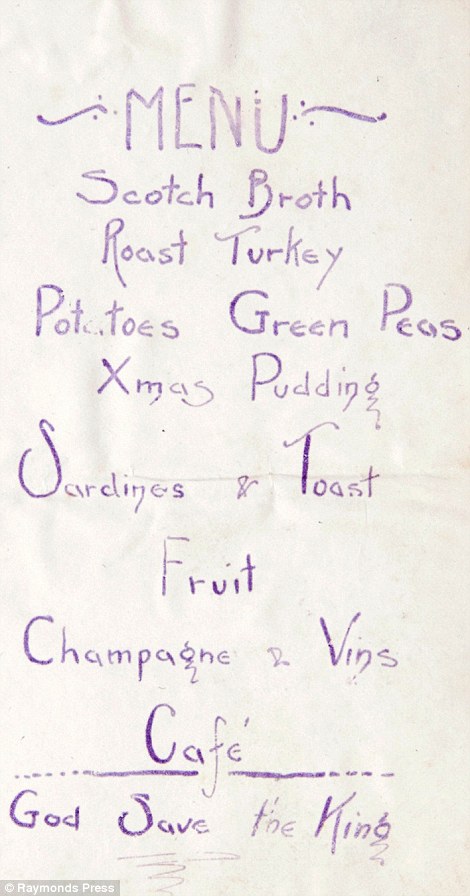
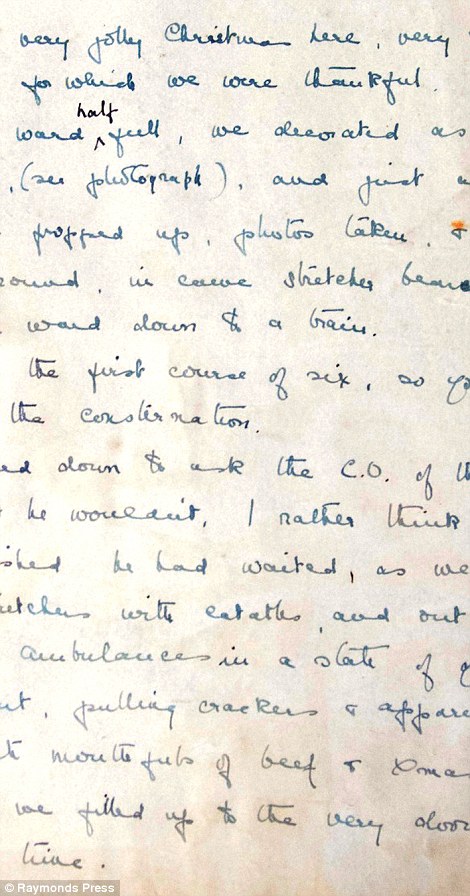
A menu for a World War One Christmas dinner, pictured top, and a letter written by Miss Gossett
The scrapbook is illustrated with postcards of the time and private photographs, including one of the author in uniform.
Adrian Stevenson, Militaria Expert at Hanson's Auctioneers: 'Interest in The Great War is at an all-time high as we now pass the 100th anniversary.
'Unpublished accounts always attract interest from collectors and historians alike.
'I was captivated by the scrapbook. I would like to think Miss Gossett would be amused today at the amount of interest her scrapbook will create.
'She covers many of the famous actions of the war all written on various scraps of paper, both official and otherwise.
'She illustrated this with postcards and private photographs, including one of herself in her nurse uniform.
'This is a fascinating and important document which I hope will be preserved for generations to come and add to understanding of the horrors that occurred in the Great War and all those brave men and women who gave their lives to give us the freedom we enjoy today.'
The album is being offered for auction in Hanson's Auctioneers specialist Militaria sale on the 23rd November at Etwall Auction Centre, Derbyshire, with a guide of £400-£600.
The seemingly innocuous item, written by nurse Violet Gossett who served in France during the conflict, was about to be discarded until experts in Derbyshire deemed it an important piece of British history.
Miss Gossett wrote graphic accounts of the horrors of the war, from brains 'oozing' out of head wounds to amputations without proper equipment.
The scrapbook was found at a home in the Midlands by an anonymous vendor and was taken to Hanson's Auctioneers of Derbyshire.
Auctioneer Charles Hanson, said: 'The book contains extracts of the day to day life of a young nurse named Violet Gossett who looked after our heroes serving on the Western Front from 1916-1919.'
'Imagine a ward full of men with their brains oozing out': First World War nurse's scrapbook describing the horrors of the Western Front is discovered in an attic
Scrapbook of First World War pictures by nurse Violet Gossett found after being left untouched for 90 years
It was found in the attic of a Midlands home and almost thrown away before experts in Derby noticed its worth
Extracts show horrific scenes in military wards along with postcards, letters and a Christmas Day menu
The scrapbook is expected to be sold for between £400-£600 at auction later this month
By Joseph Curtis For Mailonline
11 November 2015
Daily Mail
A poignant scrapbook containing a first-hand account of some of the atrocities of the First World War has been discovered in an attic after it lay untouched for 90 years.
The seemingly innocuous item, written by nurse Violet Gossett who served in France during the conflict, was about to be discarded until experts in Derbyshire deemed it an important piece of British history.
Miss Gossett wrote graphic accounts of the horrors of the war, from brains 'oozing' out of head wounds to amputations without proper equipment.

A photo from the lost scrapbook showing wounded soldiers being treated in a military ward in France during the First World War.

The scrapbook was found at a home in the Midlands by an anonymous vendor and was taken to Hanson's Auctioneers of Derbyshire.
Auctioneer Charles Hanson, said: 'The book contains extracts of the day to day life of a young nurse named Violet Gossett who looked after our heroes serving on the Western Front from 1916-1919.
'Written in ink on paper, even the pages show the stains of warfare and are a touching and sometimes blood curdling eye witness account of the horrors of WWI.'
Mr Hanson, who appears on the BBC's Bargain Hunt, added: 'One must remember that it was forbidden for any personnel to keep accounts and diaries.
'Had these pages been discovered at the time, Miss Gossett would have been in deep trouble.'
In one extract, Nurse Gossett wrote about her traumatic efforts to treat soldiers' head wounds.
She wrote: 'We had a fearful lot of head cases about this time as the tin helmets were not in use. Imagine a ward full of men with their brains oozing out of bad head wounds'.


Miss Gossett, top, served on the Western Front from 1916 to 1919. Bottom, some of her scrapbook entries including photos of soldiers from the Indian Corps and official Army documents

What appears to be a postcard found in Miss Gossett's scrapbook, which was lost in an attic for around 90 years
Another extract said: 'Stretchers packed like sardines everywhere...they come in lying on stretchers in pools of blood all soaked through to the skin..also plastered head to foot in mud.
'Two colonels died here last night and they cannot get the men buried.
'The mortuary was full up, the dead Tommies had been piled up there each in a blanket with their bare feet sticking out'.
Later she mentioned a visit from Lord Derby who had asked if they had everything they wanted.
She replied: 'No...we have an average of one fork for six men. The CO was very angry afterwards.'
There are touching sentimental moments such as Christmas day 1916 which she described as 'very jolly with very few bad cases which we were thankful.
'We decorated where we could. Soup was the first course of six...and we had a different wine with every course..It was great fun and we danced afterwards'.


A menu for a World War One Christmas dinner, pictured top, and a letter written by Miss Gossett
The scrapbook is illustrated with postcards of the time and private photographs, including one of the author in uniform.
Adrian Stevenson, Militaria Expert at Hanson's Auctioneers: 'Interest in The Great War is at an all-time high as we now pass the 100th anniversary.
'Unpublished accounts always attract interest from collectors and historians alike.
'I was captivated by the scrapbook. I would like to think Miss Gossett would be amused today at the amount of interest her scrapbook will create.
'She covers many of the famous actions of the war all written on various scraps of paper, both official and otherwise.
'She illustrated this with postcards and private photographs, including one of herself in her nurse uniform.
'This is a fascinating and important document which I hope will be preserved for generations to come and add to understanding of the horrors that occurred in the Great War and all those brave men and women who gave their lives to give us the freedom we enjoy today.'
The album is being offered for auction in Hanson's Auctioneers specialist Militaria sale on the 23rd November at Etwall Auction Centre, Derbyshire, with a guide of £400-£600.
Last edited: